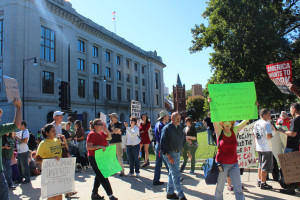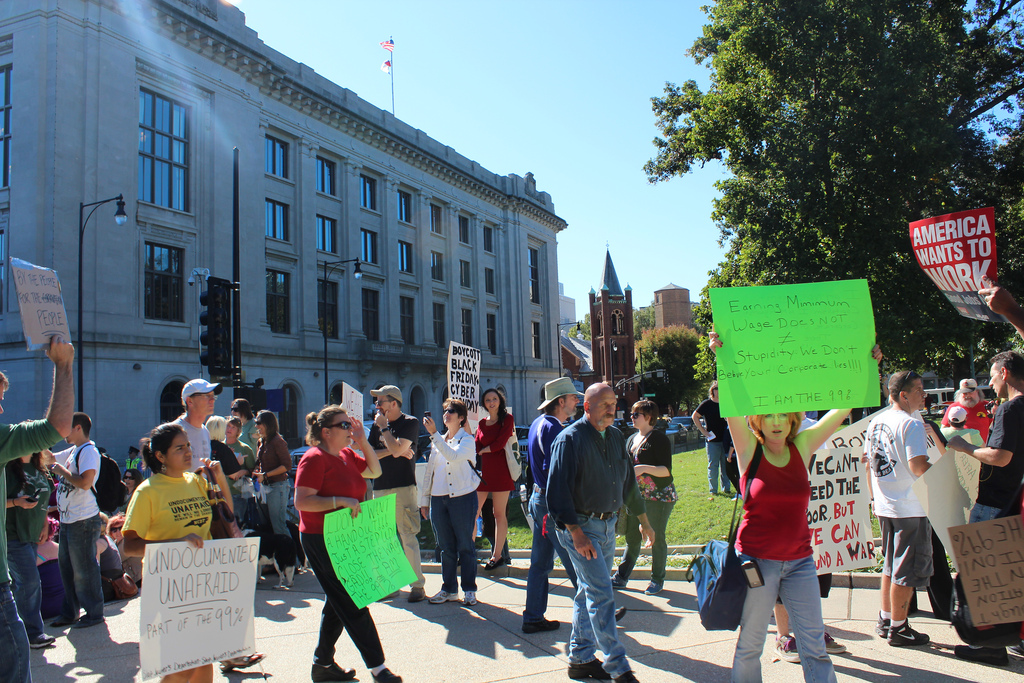
By Emma Akpan
While everyone watched the House Bill 2 fallout, I got excited, because although North Carolina is no stranger to protests and direct action. I’ve never seen direct action have such immediate results.
Since House Bill 2 was passed, >> many large business are boycotting North Carolina by refusing to expand jobs in our state. Some states and municipalities, including New York and San Francisco, are banning non essential travel to North Carolina
And Monday, we learned that the >> United States is suing the State of North Carolina because it violates Title IX education law and the Civil Rights Act. The fallout is they will restrict funding to North Carolina’s education systems because of House Bill 2’s violations.
And while we are celebrating the results of our organizing, it’s important to remember the role of smaller, people of color-led organizations in this effort.
House Bill 2 affects all of us in the state of North Carolina. Not only is it directly discriminatory to transgender individuals, it also bans municipalities from passing their own anti-discriminatory policies and raising the minimum wage. As cities begin the recognize the needs of their residents, they need to be able to adjust policy and accommodate.
But House Bill 2 is unique because it does directly discriminate against one particular group of our community, transgender people. Supporters have inaccurately accused transgender North Carolinians of being a moral threat and a safety concern to gain traction for this bill. Since they are most targeted, it’s important to hold them at the center of the conversation, and the rest of us should support.
In particular, one coalition led by young people of color initiated a direct action that allowed us to support our fellow citizens directly targeted by this legislation.
On March 24, >> when Governor McCrory signed House Bill 2 , a coalition of young people, led by the North Carolina Black Lives Matter Queer People of Color Caucus and Southerners on a New Ground (SONG) showed us what it meant to have young people leading rallies. The event happened in front of the Governor’s Mansion on Blount St in Raleigh, there were no podiums, no mics, no media lined up interviewing us, just young people on megaphones making impromptu and heartfelt speeches about what such legislation does to us.
One speaker reiterated that this bill is not about bathrooms, which many of us have heard and understood. And while this bill affects all of us, she held trans people of color at the center of the conversation, because supporters of House Bill 2 are targeting them the sharpest.
She talked about Blake Brockington, a Charlotte trans-teen who committed suicide. She talked about the rates of Black trans-youth being murdered. She reminded us that the the life expectancy of a >> trans-woman of color is 35 . She told us that the stigma trans-people experience in bathrooms leads to their deaths.
That evening, >> five young people were arrested for shutting down the streets. The activists sat in the streets, with the queer people of color seated in the center. The rest of us circled around them. We centered the most marginalized just in case the protest got confrontational, and the people most likely to be targeted, queer people of color, were shielded by allies.
The March 24th protest is symbolic of the greater movement. A common saying in the organizing community is, “when the most marginalized people are free, then we are free.” This means, in order for it to be about all of us, we have to liberate and protect the people more likely to targeted with violence and accused of being morally corrupt.
We do that by not always inserting ourselves into someone else’s experience. While it isn’t always about me, it is about people we love. It’s about our neighbors, our co workers, and for me, the health center visitors that I talk to weekly about their emotional and financial struggles with being trans, and this bill just added injury to insult. So it’s up to us, to show up and stand on the outskirts and protect the ones that are more marginalized than we are.

There are no comments
Add yours